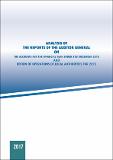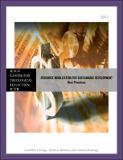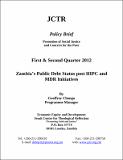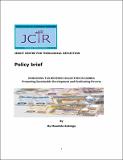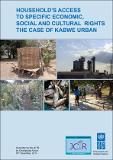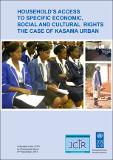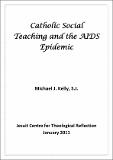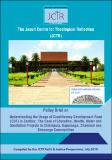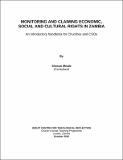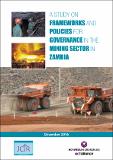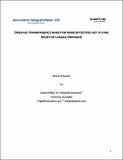Jesuit Centre for Theological Reflection (JCTR) Digital Repository: Recent submissions
Now showing items 1381-1400 of 1435
-
Analysis of The Reports of The Auditor General on The Accounts For The Financial Year Ended 31St December 2015 And Review of Operations of Local Authorities For 2015
(2017)The JCTR has over the years advocated improvement in Zambian citizens’ access to essentials of life. They include access to education, health, water and sanitation. Select cases of concern have therefore been identified ... -
Resource Mobilization For Sustainable Development: Best Practices
(2011)Every government needs to mobilize financial resources to finance its development programme. The need to mobilize sufficient financial resources is even more urgent for developing countries like Zambia, as they have more ... -
Economic Partnership Agreements: A Challenge for Trade Justice
(2007)In the last three years, the Debt and Trade Project (now Debt Aid and Trade Programme, DAT) of the Jesuit Centre for Theological Reflection (JCTR) invested in understanding the trade challenges faced by Zambia and other ... -
Taking Hold of Our Future Through The African Peer Review Mechanism
(2009-03)The obvious purpose of this Working Paper is to assist all stakeholders (e.g., government, civil society, and private sector) in Zambia to own an informed and effective place in the APRM process that will mean an improved ... -
Zambia’s Public Debt Status Post HIPC And MDR Initiatives
(2012)The Public Debt reforms that the Zambian Government embarked on in 2004 aimed at strengthening debt management capacities of various Government institutions engaged in debt management should be accelerated. Currently, the ... -
Enhancing Tax Revenue Collection in Zambia: Promoting Sustainable Development And Eradicating Poverty
(2015)This policy brief presents evidence on the Zambian tax system. Its core argument is that we need a radical overhaul of the tax system in order to increase domestic revenue to spend on measures to reduce poverty. In Annex ... -
Household's Access to Specific Economic, Social and Cultural Rights: The Case of Kabwe Urban
(2014-12-07)This report is one of three reports produced for phase I of the JCRT/UNDP project on access to ESCRs. ESCRs are socio-economic human rights which include the right to education, right to housing, right to adequate standard ... -
Household's Access to Specific Economic, Social and Cultural Rights: The Case of Kasama Urban
(2014-12-14)This report is one of three reports produced for phase I of the JCRT/UNDP project on access to ESCRs. ESCRs are socio-economic human rights which include the right to education, right to housing, right to adequate standard ... -
Zambia’s Economic, Social and Cultural Rights: Why Should They Be in the New Constitution?
(2004-12)Why are there so many people around us today in Zambia who are jobless, homeless, hungry, illiterate, failing to access proper medical care, and without safe water and sanitation? Is this the result of some authority’s ... -
Women's Participation in The Catholic Church
(2010)The study provides findings on which recommendations are made for enhancing the participation of women in the Diocesan decision making structures so as to promote equitable and democratic governance. Gender roles and how ... -
Hiv And Aids: A Justice Perspective
(2006-04)Almost twenty-five years have passed since the publication of the first report on what was to develop as the AIDS pandemic. During those years HIV and AIDS have expanded at an accelerating rate in every continent and now ... -
Church’s Social Teaching And The Economy In Zambia
(2003-11-29)Since we are going to be talking about Zambia in great detail this afternoon, I want to open with a phrase I use more and more these days: "Zambia is a very rich country, a very rich country indeed, but Zambia is a country ... -
Catholic Social Teaching And The AIDS Pandemic
(2011-01)The Church’s social teaching refers to a body of teaching on social, economic, political and cultural matters developed over a long period by the Catholic Church, but proposed more explicitly and systematically in the years ... -
A Church in The Modern World of Africa: The Zambian Experience
(2005-03)Zambia became independent of British colonial rule in 1964, one year before that greatest document of the Second Vatican Council, Church in the Modem World (Gaudium et Spes), was published. The Catholic church in Zambia ... -
Understanding the Usage of Constituency Development Fund (CDF) in Zambia: The Case of Education, Health, Water and Sanitation Projects In Chishipula, Kapulanga, Chamboli and Simoonga Communities
(2019-07)In Zambia, the Constituency Development Fund (CDF) was introduced in 1995 as “instrument” to facilitate the deliverance of public developmental goods and services directly to local communities. Despite the introduction of ... -
Monitoring and Claiming Economic, Social and Cultural Right in Zambia
(2010-10)One of the basic foundations of human dignity is the enjoyment and/or realisation of economic, social and cultural rights (ESCR). ESCR are entitlements which guarantee that socio-economic opportunities are made available, ... -
A Study on Frameworks And Policies For Governance in The Mining Sector in Zambia
(2016-12)Most of Zambia’s large-scale copper mines are located on the Copperbelt Province and North- Western Province. Zambia like all states has an obligation to respect human rights and fundamental freedoms as enshrined in the ... -
An Evaluation of The Strengths And Weaknesses of Public Debt Management in Zambia And Management Legal Review
(2007-11)Zambia’s external debt has had a number of effects on the Zambian economy. The HIPC debt agreement, coined in 1996 to help countries like Zambia faced with a huge debt problem and a high fiscal deficit resulted in Zambia ... -
Human-Needs Based Debt Sustainability Analysis: A Challenge For Zambia
(2005-06)In this report. Jubilee Zambia presents a proposal of a set of guides on the development of a human- needs based Debt Sustainability Analysis Framework (DSA.). This proposal is formulated with a view to stimulate dialogue ... -
Does Aid Transparency Make For More Effective Aid? A Case Study of Lusaka Province
(2011-09)The main general hypothesis regarding aid is that it plays a critical role in fostering economic growth and development in the recipient countries. However, several empirical studies do not corroborate this hypothesis. It ...

